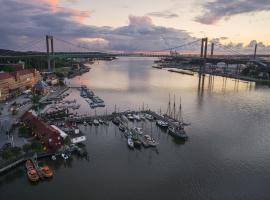Chalmers is becoming a unique marketplace for energy
The project Fossil free Energy Districts (FED) is quite unique in taking a holistic approach to all energy supplies – from electricity to heating and cooling. By way of a customized digital marketplace, the energy system will balance supply and demand for energy, depending on a variety of parameters.
Per Löveryd is the energy team leader at Akademiska Hus, the property owner who together with Chalmersfastigheter will host the FED system. They recently concluded what investments should be made, given the results from the simulations made by Chalmers University of Technology.
Akademiska Hus owns the largest part of the buildings and energy systems that are involved in FED. Since they own the local energy system, they also have the freedom to develop and change it into the better.
“We always want to learn more about how to save energy and power and how to keep our costs down. We also want to strengthen the cooperation with our customers”, Per says.
Heat storage, both seasonal and short term, is considered an important means for cheaply balancing high shares of variable renewable electricity production. Akademiska Hus has decided to invest in a heat storage tank and control systems for power reduction in their buildings. Chalmersfastigheter will invest in photovoltaics, a hot water heat pump, a connection to one of the buildings and control systems for power reduction.
“The heat storage tank gives us the possibility to test if it is cost efficient to store heat in a tank compared to storage in buildings. Both options are included in FED and therefore gives us an occasion to evaluate two systems”, Per says.
A group of researchers at Chalmers have done simulations and analysis during the spring and summer to build the models that will make the energy system and the marketplace work.
"We have developed an investment model that prescribes technical solutions one should choose to reach the goals to reduce energy consumption and cut energy peaks at the campus area," says David Steen, researcher at the Department of Electrical Engineering. "It also shows how the system should be operated by combining different energy sources, depending on what is most beneficial in terms of environment and economy, at any given time."
Takes care of excess energy
"Electricity, heat and cooling produced at Chalmers can be stored and transferred between the buildings. Thus, we can use excess energy and keep down the amount of electricity that needs to be generated locally or purchased from outside", says David. "To a large extent, campus already is self-sufficient in terms of district heating, thanks to Kraftcentralen – Chalmers' own combined heat and power plant (CHP)."
The researchers recommend a combination of different production techniques and energy storage, such as combined heat and power plant, solar panels, heat pumps, absorption chillers, batteries and thermal storage. Some of this already exists on campus today, but a good deal remains to be built in the coming year. In September, investment decisions with a budget of 15 million will be made.
The new energy system will also benefit from investments that the property manager Akademiska Hus is planning, in addition to the FED project plans.
Full operation by the end of 2018
The researchers will continue to refine and complete the model through 2018. For example, forecasts for energy use will be included, as well as any restrictions affecting the transmission possibilities.
“Our project partner Akademiska Hus is already working actively to reduce energy consumption in the premises. Therefore, it will be an additional challenge for us to reach the goal of reducing energy imports by as much as 30 percent," says David.
This autumn, construction work will start on campus and in December 2017, the first version of the energy marketplace will be launched. From autumn 2018, everything is planned to be fully operational and after one year of operation, conclusions will be drawn, useful for EU cities wanting to implement the system on a larger scale.
Continued research on the future energy system
“It's really an exciting project to work in”, says David. “We all contribute with different competences in the cooperation. In addition, it gives us the opportunity to continue our research about local energy systems and to further develop the models we have created. Small local energy systems will be increasingly important for fossil-free and renewable energy supply in the future. There is an increasing interest in this, which benefits the society and also means a profitable development for different types of property owners.
Author: Yvonne Jonsson, E2 Operations support, Chalmers University of Technology





















